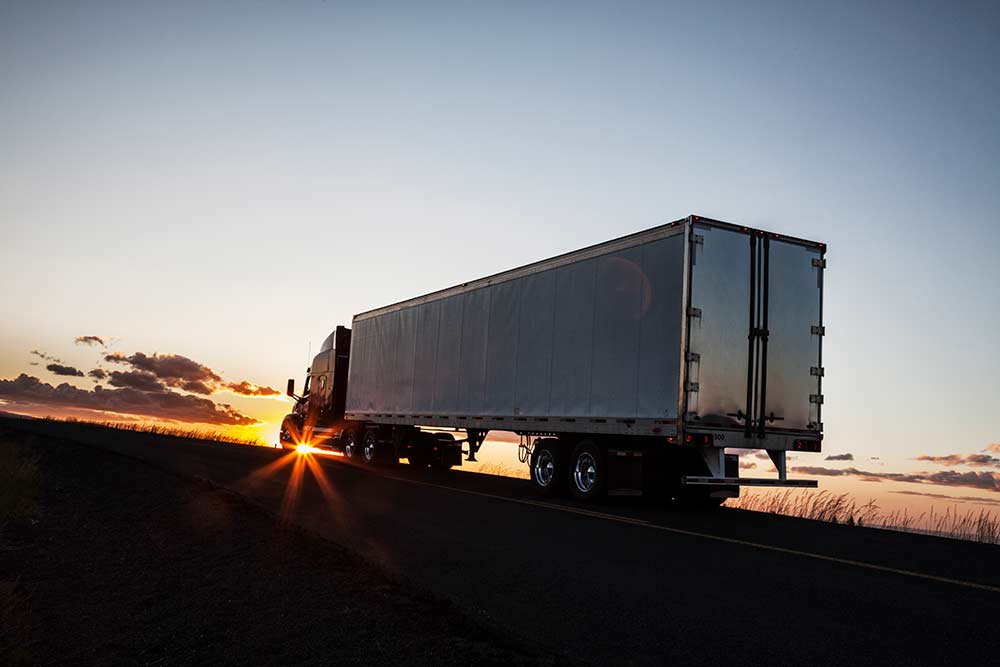
7 Tips for How to Find Reliable Power Only Trucking Services
November 14, 2024
Exploring the Rise of Power Only Trucking Companies
November 28, 2024
7 Tips for How to Find Reliable Power Only Trucking Services
November 14, 2024
Exploring the Rise of Power Only Trucking Companies
November 28, 2024
Table of contents
ShowHide- What Is a Power Only Trailer?
- The Role of Power Only Carriers in Logistics
- How Power Only Trucking Works
- Benefits of Using Power Only Services
- Challenges and Considerations in Power Only Trucking
- Industries That Rely on Power Only Trailer Services
- The Future of Power Only Trucking
- Tips for Success in Power Only Trucking
- Conclusion
- Why Choose Tristate Transportation for Power Only Trailer Services?
- How to Get Started
In the world of trucking, power only trailers play a crucial role. They offer flexibility and efficiency that traditional trailers can't match.
But what exactly are power only trailers?
This guide will delve into the specifics of power only trailers. It will explain how they operate and the unique benefits they offer.
We'll also explore the role of power only carriers in the logistics sector. You'll learn how they can streamline operations and boost cost-effectiveness.
Whether you're a trucker, fleet manager, or logistics professional, this guide will provide valuable insights.
So, let's embark on this journey to understand power only trailers and their impact on the transportation industry.
What Is a Power Only Trailer?
A power only trailer is a distinctive feature in trucking. They differ from standard trailers as they require no permanent attachment to a truck. Instead, a power only truck provides the necessary pulling power to move the trailer.
The term "power only" describes the reliance on a separate truck to transport the trailer. This setup allows flexibility because the truck can detach and engage with other trailers as needed. It makes power only trailers an appealing option for many logistical operations.
In essence, power only trailers are independent units. Here are some key characteristics:
- They require a separate truck tractor to operate.
- They offer flexibility in logistics.
- They allow multiple trailer configurations.
Industries often use power only trailers for transporting various cargo types. From consumer goods to industrial equipment, these trailers prove versatile. They accommodate different weights and sizes, making them a staple in logistics.
In conclusion, understanding power only trailers starts with knowing their distinct separation from the truck tractor. This independence is what makes them versatile and valuable assets in many operations.

The Role of Power Only Carriers in Logistics
Power only carriers play a vital role in modern logistics, offering specialized services that enhance flexibility. They bring the power of seamless movement by connecting available power units with various trailers. Their ability to maneuver different trailers as needed increases operational adaptability.
These carriers act as a bridge between shippers and owners of trailers, filling gaps in logistics supply chains. By utilizing power only services, companies can meet fluctuating demands without the commitment of a full-time fleet. This service model is crucial in peak seasons or for time-sensitive deliveries where agility is essential.
Power only carriers also streamline operations by reducing downtime. Once they drop one trailer, they can quickly pick up another, maximizing efficiency. This ability allows businesses to keep goods moving without the delays typical of owning and operating a dedicated truck fleet.
Incorporating power only carriers into logistics strategies offers numerous benefits. It provides the much-needed elasticity to navigate complex distribution networks efficiently. For any logistics plan aiming to remain nimble, power only carriers represent an indispensable resource.

How Power Only Trucking Works
Power only trucking centers around using a tractor to haul trailers provided by another entity. This method separates the ownership of the tractor from that of the trailers, offering a unique operational model. Power only carriers supply just the power needed to transport the trailers.
The key advantage is that businesses don't need to purchase or maintain their own trailers. Companies can leverage the flexibility of ready-to-move freight without hefty investments. By employing power only trucking, firms optimize logistics without capital commitment.
Several industries prefer this model for its adaptability. It caters to those with fluctuating freight requirements, like retailers during peak seasons. For such enterprises, the benefits are clear.
Here are essential aspects of power only trucking:
- Flexibility: The carrier provides tailored solutions as demands shift.
- Scalability: Businesses can increase or decrease capacity based on need.
- Cost Savings: Eliminates ownership costs of trailers.
These factors underscore why many companies turn to power only trucking. They enhance logistics by ensuring products reach destinations swiftly, meeting various industry needs without the hassle of managing entire fleets.
The Process of Power Only Trucking
The process begins when a power only trucker arrives at a designated pickup point. There, they secure the trailer to their tractor, ensuring all connections are safe and compliant. Afterward, they transport the trailer to its intended destination.
Upon reaching the drop-off location, the power only trucker detaches the trailer. This step requires precision and care to prevent damage. Once unhooked, the trucker may transition quickly to another assigned load, minimizing downtime.
This cyclical nature of connecting, delivering, and releasing trailers allows for seamless operations. It maximizes the use of available resources, keeping the logistics network agile and efficient.
Equipment and Tractor Requirements
Power only trucking necessitates reliable equipment, specifically a well-maintained tractor. This vehicle must be equipped to handle different trailer types, ensuring versatility in service. Standard features include robust coupling systems and adaptable brake connections.
The tractor needs to be regularly inspected and serviced to ensure safety and performance. Proper maintenance guarantees that the tractor can manage various loads without issues. Adhering to a rigorous maintenance schedule reduces breakdown risks significantly.
Additionally, having skilled drivers is crucial. Their expertise in connecting and maneuvering trailers ensures safe and efficient transportation. Drivers' proficiency in using the tractor's features further enhances operational efficiency and reliability in power only trucking.

Benefits of Using Power Only Services
Power only services offer businesses numerous advantages, particularly in flexibility and cost management. This model empowers companies to adjust to changing freight demands without the burdens of trailer ownership. It streamlines operations, enhancing both logistical flexibility and financial efficiency.
Several benefits come with using power only services:
- Reduced Capital Expenditure: No need to invest in trailers.
- Operational Flexibility: Quickly adapt to changing transport needs.
- Reduced Maintenance Costs: Focus only on tractor upkeep, reducing total cost.
- Access to Specialized Equipment: Use industry-specific trailers when needed.
These services also boost supply chain responsiveness. They enable rapid scaling of transport capacity during peak periods, such as holiday seasons or special events. Furthermore, businesses can divert resources to core functions, improving productivity across operations.
By choosing power only services, companies can focus on their strengths. They streamline the logistics process, ensuring products are delivered on time without extensive trailer management. This efficiency translates into a significant competitive advantage in fast-paced markets.
Cost-Effectiveness and Flexibility
Power only trucking eliminates the need for significant investments in trailer fleets. Businesses can allocate financial resources more strategically, focusing on growth opportunities. The reduction in capital expenditure frees up cash flow for other vital operations.
Flexibility is another core benefit. As customer demands shift, the ability to scale transport operations up or down quickly becomes invaluable. Companies can tailor their logistics approach to align perfectly with market conditions and forecasts.
This adaptability reduces the risk of excess or insufficient capacity. In turn, it ensures that supply chain operations run smoothly, even during unpredictably busy periods. Such responsiveness helps maintain customer satisfaction and loyalty.
Efficiency and Asset Utilization
Power only services improve asset utilization by ensuring tractors are continuously engaged. This optimal use of equipment reduces idle time and boosts operational efficiency. When tractors are on the move, overhead costs decline, and resource allocation improves.
Additionally, using third-party trailers allows businesses to transport diverse freight types. This adaptability ensures the right trailers for various loads, without the need for ownership. Companies can respond swiftly to new opportunities or challenges.
This model also promotes smarter resource use. By focusing solely on tractor maintenance, logistics operators streamline service schedules. They concentrate efforts on key assets, ensuring their fleet remains robust and dependable in every transport scenario.
Challenges and Considerations in Power Only Trucking
While power only trucking offers many benefits, it also presents certain challenges. These may include logistical hurdles and operational complexities. Companies must address these to fully leverage the advantages of this model.
One key consideration is ensuring the compatibility of tractors and trailers. Different loads and trailers require specific configurations. Mismatches can lead to delays or damages, impacting supply chain efficiency.
Another significant challenge is managing scheduling and coordination. Timely pick-up and delivery are crucial for maintaining service levels. Companies must plan meticulously to ensure smooth transitions and avoid logistical bottlenecks.
Lastly, businesses should evaluate the legal and regulatory landscape. Power only trucking involves various compliance requirements. Understanding these is critical for avoiding fines and ensuring smooth operation within legal frameworks.
Licensing, Insurance, and Regulatory Compliance
Operating power only trucking services requires strict adherence to licensing requirements. These regulations vary by region and can impact the operational scope of a business. Obtaining the necessary permissions ensures legality and reduces the risk of sanctions.
Insurance is another crucial factor for power only trucking. Adequate coverage protects assets and minimizes financial risks. Both tractors and cargo need appropriate policies to cover potential losses or damages.
Regulatory compliance is non-negotiable in this industry. Companies must stay updated on transportation laws and industry standards. Regular audits and compliance checks can safeguard against legal complications and keep operations seamless.
Finding Reliable Power Only Carriers
Identifying dependable power only carriers can be challenging. Reputation and track record are critical in selecting the right partner. A carrier with strong credentials ensures timely and safe delivery of goods.
Research is key when vetting potential carriers. Seeking references and reviewing feedback can offer insights into reliability. A thorough background check helps avoid pitfalls with less reputable operators.
Building relationships with trustworthy carriers is beneficial for long-term logistics success. Communication and transparency foster partnerships that support business objectives. Collaboration ensures that both parties align on goals, leading to efficient and effective freight management.

Industries That Rely on Power Only Trailer Services
Power only trailer services are versatile and cater to a wide range of industries, including:
Rental and Leasing Companies
These companies often need trailers moved between locations or delivered to customers quickly. Power only services ensure trailers are where they need to be without disrupting operations.
Trailer Manufacturers
Transporting trailers to distribution centers or directly to customers is simplified with power only trailer services.
Auction Houses
Moving trailers to and from auction sites is critical for maintaining a steady flow of inventory.
Disaster Relief Organizations
Trailers loaded with supplies or debris require quick and reliable transport during emergencies.
Retailers and Logistics Providers
Businesses with high volumes of freight use power only trailer services to keep goods moving efficiently.
The Future of Power Only Trucking
The future of power only trucking looks promising with industry evolution and technological advances. These changes are set to transform operations and enhance efficiencies. Companies need to stay ahead of these trends to remain competitive.
As technology progresses, power only trucking will see innovative tools that streamline tasks. From automated scheduling to advanced tracking, these technologies will improve logistics management. Businesses that adopt these early will likely gain a competitive edge.
Moreover, economic factors and consumer demands will influence the industry's trajectory. There's potential for growth as more companies seek flexible and cost-effective logistics solutions. Adapting to these shifts will be crucial for power only carriers aiming to expand.
Lastly, global trade dynamics and regulatory changes may also shape the future. Companies should be prepared for shifts in trade policies or environmental regulations. Remaining adaptable and informed will help in navigating any future challenges successfully.
Technological Advancements and Industry Trends
Technology is playing a pivotal role in reshaping power only trucking. Innovations like real-time tracking and data analytics are enhancing operational efficiency. These tools provide valuable insights for optimizing routes and managing loads effectively.
Automation is another trend gaining momentum. It offers the potential to reduce human error and streamline logistics processes. Power only carriers can utilize automation for improved scheduling and minimizing downtime.
Electric and autonomous vehicles are on the horizon for the trucking industry. While still in development, they promise reduced emissions and enhanced road safety. Forward-thinking companies are preparing to integrate these advancements for future operations.
Environmental Impact and Sustainability
Sustainability is becoming a key focus area for power only trucking. This industry has the potential to significantly reduce its environmental footprint. By optimizing routes and maximizing load efficiency, emissions can be decreased.
Efforts toward greener operations are gaining traction. Power only carriers are exploring alternative fuels and more efficient vehicles. These initiatives not only support environmental goals but also reduce operational costs.
Sustainable practices in trucking can also enhance brand reputation. Companies prioritizing eco-friendly logistics often appeal to environmentally conscious clients. This approach can create new opportunities and partnerships that value sustainable transport solutions.
Tips for Success in Power Only Trucking
Achieving success in power only trucking requires strategic planning and execution. Both truckers and fleet managers play crucial roles in ensuring efficient operations. Each stakeholder must focus on their specific responsibilities for optimal results.
For truckers, understanding the equipment and regulations is essential. Reliable equipment and compliance with legal requirements can significantly impact your efficiency. Adopting new technologies can also enhance your operational capabilities.
Shippers and fleet managers should prioritize solid partnerships. Reliable power only carriers can make or break logistics efficiency. A strong network can provide flexibility and ensure timely deliveries.
Below are some key tips for thriving in power only trucking:
- Stay updated with industry developments.
- Embrace technology for enhanced efficiency.
- Focus on building strong partnerships.
- Prioritize equipment maintenance and compliance.
For Truckers and Owner-Operators
Truckers and owner-operators have unique opportunities in power only trucking. Staying informed about industry regulations and equipment requirements is vital. Keeping your licenses and documents in order will ensure smooth operations.
Investing in technology is a smart move. Tools for tracking and scheduling can streamline operations. These innovations aid in managing routes and optimizing fuel efficiency.
Building connections within the industry is beneficial. Networking with other professionals can open doors to new opportunities. A strong professional network can lead to more contracts and insights.
For Shippers and Fleet Managers
Shippers and fleet managers must focus on effective communication and coordination. Open lines of communication with carriers can minimize misunderstandings. This ensures that operations run smoothly and delivers on time.
Efficient selection and vetting of power only carriers are vital. Look for carriers with a proven track record and reliability. A thorough vetting process can help build strong and long-lasting partnerships.
Embracing technology and data analytics is crucial for managers. These tools can provide insights into supply chain efficiencies. Data-driven decisions can lead to optimized operations and better resource management.
Conclusion
Understanding power only trailers can transform logistics operations. They offer flexibility, efficiency, and cost-effective solutions for transportation needs. Truckers, shippers, and fleet managers can benefit significantly by embracing this approach.
By overcoming challenges such as regulations and equipment demands, stakeholders can achieve success. Both technology and strategic partnerships play pivotal roles in maximizing the advantages of power only trucking. Staying informed and adaptable is key.
The future of power only trucking looks promising with technological advances and sustainability gains. Adopting these practices today can position businesses for growth and innovation in the evolving transportation landscape.
Why Choose Tristate Transportation for Power Only Trailer Services?
At Tristate Transportation, we specialize in power only trailer transport, providing dependable, cost-effective solutions tailored to your needs. Our network of professional drivers and advanced tracking systems ensures a seamless experience from pickup to delivery.
How to Get Started
If you’re ready to simplify your trailer transport, we’re here to help. Contact us today for a free quote or to learn more about our power only trailer services.
Get a Quote

